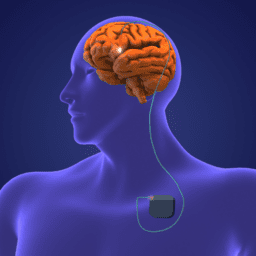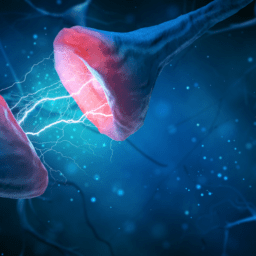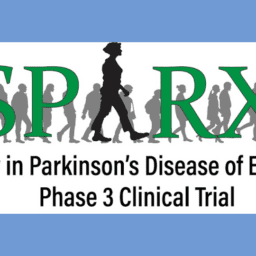Iron chaperone patents. Genes and cognition. Deep sleep and alpha-synuclein. Berries for longer life. Building Parkinson’s awareness, with the help of llamas. Here’s what’s new in the world of Parkinson’s this month. Happy new year!
PARKINSON’S ARTICLES
- Findings from a study involving 237 people with early-stage Parkinson’s who were followed by researchers for up to six years showed that people who got at least at least four hours of moderate to vigorous exercise each week had slower decline in balancing and walking five years later, compared to participants who did not get that much exercise. The research, published in Neurology, “suggest[s] it may never be too late for someone with Parkinson’s to start an exercise program to improve the course of their disease,” said study author Kazuto Tsukita, MD. “That’s because we found that to slow progression of [Parkinson’s], it was more important for people with Parkinson’s to maintain an exercise program than it was to be active at the beginning.”
- Adding further support to the belief that exercise is medication for Parkinson’s, results recently published in Annals of Neurology from a double-blind randomized controlled trial showed that aerobic exercise stabilizes progression of motor symptoms and improves cognitive function in people with Parkinson’s. The study, conducted by Park-in-Shape, included 130 people with Parkinson’s and found that the benefits of aerobic exercise were associated with increased neuronal connectivity and reduced brain atrophy.
- A study published this month in Neurology suggests that eating three or more servings per week of foods high in flavonoids (such as tea, apples, and berries) may help people with Parkinson’s live longer.
- Published in Clinical Parkinsonism & Related Disorders, a study conducted by researchers at the University of North Dakota found that the prevalence of Parkinson’s is higher in states with more lead pipes transporting water from municipal sources to homes. Their statistical analyses add support to previous studies suggesting that lead exposure may increase the risk of developing Parkinson’s.
- Researchers at Rush University Medical Center have conducted what may be the first clinical trial exploring the impacts of interdisciplinary home visits from healthcare providers on the quality of life of homebound people with advanced Parkinson’s. Results from the study, which has recently concluded, are expected soon.
- According to a small study published in the journal Sensors, a simple test that involves measuring changes in hand temperature after immersion in cold water may help lead to earlier Parkinson’s diagnoses.
- Findings from a study about traumatic brain injury (TBI) published in Alzheimer’s & Dementia showed that TBI was associated with a 4.9-year earlier age of Parkinson’s onset. TBI was not, however, associated with earlier death or severe Parkinson’s-related nerve cell damage.
- A vaccine designed to generate high levels of antibodies specific to various regions of pathological alpha-synuclein showed protective efficacy in a mouse model of synucleinopathies. Researchers at the Institute for Molecular Medicine and the National Institute of Aging, in collaboration with the University of California, Irvine, and the University of California, San Diego, investigated four vaccines and found that one, PV-1950, showed the most significant reduction of alpha-synuclein and neurodegeneration in the brains of vaccinated mice.
- Certain genes may impact the severity of cognitive impairment in Parkinson’s more than others, according to a recent review. Researchers found that among autosomal dominant forms of Parkinson’s, SNCA-Parkinson’s is most frequently associated with cognitive impairment, with certain mutations clearly increasing the risk of early dementia. Among people with LRRK2-Parkinson’s, the frequency of cognitive impairment was found to be similar or lower than that observed in idiopathic Parkinson’s.
- With the help of a $387,000 grant, researchers at the Queen’s Medical Center in Honolulu will investigate how Asian Americans, Native Hawaiians, and Pacific Islanders are impacted by Parkinson’s. “This research project will work to break down barriers of care for these specific populations and provide best recommendations on how they can receive appropriate care at the highest level,” says Michiko Bruno, medical director of the Parkinson’s and Movement Disorder Center at Queen’s.
- Led by researchers at UCLA Health, a multi-institution study has identified several overlooked issues affecting women with Parkinson’s and issued a call to action for ways to address the unmet needs of this community.
- Scientists at University Hospital of Zurich who are exploring new links between sleep (or lack thereof) and Parkinson’s believe that deep sleep may limit the accumulation of alpha-synuclein in the brain and slow the progression of Parkinson’s.
PARKINSON’S treatments and THERAPIES
- Results from the Parkinson Disease Medication (PD MED) trial, recently published in JAMA Neurology, showed that among 500 people with Parkinson’s whose symptoms were not being optimally treated by levodopa alone, monoamine oxidase type B (MAO-B) inhibitors are better at treating symptoms than are catechol-O-methyltransferase (COMT) inhibitors. The data from the participant-reported assessments showed no difference in effectiveness between MAO-B inhibitors and dopamine agonists as an add-on therapy.
- An observational study published in the European Journal of Neurology suggests that early treatment with the extended-release amantadine medication GOCOVRI may delay the onset of dyskinesia. Results from the study, which was conducted by scientists in Taiwan, showed that six months or one year of GOCOVRI treatment was associated with a significantly lower likelihood (approximately 35%) of developing levodopa-induced dyskinesia at both time points.
- The United States Food and Drug Administration (FDA) has approved Alembic Pharmaceuticals’ generic, 200-mg Entacapone tablets, indicated for people with Parkinson’s to help treat end-of-dose wearing OFF.
- The United States Patent and Trademark Office has granted a new composition of matter patent to Alterity Therapeutics, covering more than 80 novel compounds and securing exclusivity for Alterity’s new class of “iron chaperones” designed to redistribute the excess iron implicated in many neurodegenerative conditions, including Parkinson’s.
- With a grant from the from the Michael J. Fox Foundation for Parkinson’s Research, Cantabio Pharmaceuticals will work to develop a small molecule that reduces the aggregation of tau, a protein that can form toxic clumps. These tau aggregates are commonly found in the brains of people with Alzheimer’s and have also been suggested to be involved in the onset Parkinson’s.
- Through a research collaboration, Iktos (a company specializing in artificial intelligence for novel drug design) and Astrogen (a clinical and research-oriented biotech company) will partner to investigate new, innovative small molecule pre-clinical drug candidates for Parkinson’s. While Iktos uses artificial intelligence to identify small molecules as candidates for Parkinson’s treatment, Astrogen will screen the candidates in the lab and inside living organisms and manage the development process from preclinical to clinical stages.
- Also partnering to advance a new Parkinson’s therapy candidate, ABL Biotechnologies and Sanofi will collaborate to develop and commercialize ABL301, a pre-clinical stage antibody that targets alpha-synuclein and insulin-like growth factor 1 receptor (IGF1R) to treat Parkinson’s and similar conditions.
- Zhittya Genesis Medicine is enrolling participants in a “Compassionate Use Clinical Trial” of its biological compound called FGF-1 to investigate the compound’s safety and efficacy in people with mild-to-moderately severe Parkinson’s. FGF-1, with the aim to stimulate new blood vessel growth in the brain, has been shown in preclinical data to improve motor function and spur regeneration of dopamine-producing neurons in mice and monkey models of Parkinson’s.
- A research team at the University of California, Irvine, published a study in ACS Chemical Neuroscience that explores why levodopa, the current gold-standard Parkinson’s medication, eventually causes bothersome side effects like dyskinesia. Using technology called surface plasmon resonance, the team found that in the presence of iron, levodopa and the protein siderocalin combine in a way that may cause a “cellular iron overload,” which in turn leads to an imbalance between free radicals and antioxidants and causes neuroinflammation in the brain. This, in turn, can cause dyskinesia, mobility issues, and freezing of gait.
- The FDA issued a partial clinical hold in response to an application by Yumanity Therapeutics requesting permission to begin a clinical trials of their Parkinson’s drug candidate YTX-7739. As a result of the decision, Yumanity will begin conducting a planned clinical trial to test single doses of the medication, a small molecule designed to block the activity of stearoyl-CoA desaturase.
- Following positive FDA feedback, Annovis Bio will continue with the necessary steps to begin Phase 3 trials of buntanetap (ANVS401), an oral therapy for both early- and late-stage Parkinson’s. Data from a Phase 2 clinical trial showed significant gains in motor skills among people with early Parkinson’s who were treated once daily with buntanetap.
PARKINSON’S LIVING WELL STORIES
- A bill making its way through the West Virginia state legislature would allow for the creation of a Parkinson’s registry in the state. If it is signed into law, the registry would be a tool for clinicians to track clinical care and outcomes and help Parkinson’s researchers refine current treatment options or try new techniques to improve quality of life for people with Parkinson’s.
- A former collegiate athlete is using her background in sports to develop innovative wearable technology to help people with Parkinson’s improve their balance.
- New York Times best-selling author Fiona Davis shares the story of accepting her Parkinson’s diagnosis in a recent Good Morning America essay.
- “Everything a professional boxer trains for is the same thing someone living with Parkinson’s is struggling with every day. They’re struggling with power, strength, agility.” Read how one Rock Steady Boxing coach helps people with Parkinson’s live well through exercise in Nashville, TN.
PARKINSON’S SURVEYS, CLINICAL TRIALS, and volunteer opportunities
PRISM Parkinson’s Research Study – The PRISM Parkinson’s Research Study is evaluating an investigational drug to determine if it might slow down the progression of Parkinson’s. Click here to learn more and see if you’re eligible to enroll.
Pass to Pass Hikes for Parkinson’s – Pass to Pass is a nonprofit dedicated to raising Parkinson’s awareness while supporting hikers with Parkinson’s. This group of volunteers (and llamas!) offers multi-day backpacking and hiking trips on the Pacific Crest Trail in Washington, Oregon, and California. Participants are being recruited now for these exciting summer 2022 events. For more details and information, visit www.passtopass.org or contact Bill Meyer at 509-991-1212 or spokanebill@gmail.com.
Parkinson’s Progression Markers Initiative – In an expanded study, the Parkinson’s Progression Markers Initiative (PPMI) is currently working to enroll up to 100,000 people with and without Parkinson’s. The study team is especially seeking to enroll people diagnosed with Parkinson’s in the past two years and who are not yet on treatment, as well as people 60 and older who aren’t living with Parkinson’s but have a risk factor for it (such as a close relative with Parkinson’s, a known Parkinson’s-associated mutation, and/or REM sleep behavior disorder). The observational study is also enrolling people with no known connection to Parkinson’s to serve as a control group. Learn more here.
TOPAZ (Trial of Parkinson’s and Zoledronic Acid) – Caroline Tanner, MD, PhD, is recruiting participants for a new remote clinical trial led by a team of Parkinson’s experts at UCSF in partnership with researchers from across the country. The goal of the study is to help people with Parkinson’s or parkinsonism maintain their independence by reducing the risk of hip fractures. The study will test if zoledronate, an FDA-approved medication for osteoporosis, can prevent fractures in people with Parkinson’s, whether or not they have osteoporosis. To learn more, visit the study website at TOPAZstudy.org, email TOPAZ@ucsf.edu, or call (415) 317-5748.
Join Google and LSVT in Project Euphonia – LSVT Global has partnered with Google on an exciting research project called Project Euphonia to help improve automatic speech recognition software for people with speech disorders. These disorders may make using devices like Google Home, The Nest and other Smart devices, Siri, Alexa, or speech-to-text frustrating. To do this, LSVT Global needs samples of disordered speech to train the system. If you’ve been diagnosed with Parkinson’s, PSP, MSA, or CBD with mild, moderate, or severe speech disorders, you are encouraged to enroll. Participation is easy, can be done from your own home, and can earn you a $60 gift card! Learn more here.
G2019S LRRK2 Parkinson’s: Increasing Awareness and Genetic Testing Program – This program aims to support the development of a precision medicine intended to treat people with genetic forms of Parkinson’s. Up to 15% of cases of Parkinson’s disease have an underlying genetic cause, yet many people have never had genetic testing. This research program will be very important in supporting the future development of a new oral precision medicine treatment for one of the most common genetic forms of Parkinson’s, aimed at slowing its progression. To learn more, visit geneticpd.com.
A PD Avengers research group is undertaking a new project called Sparks of Experience, designed to be more systematic about collecting and considering the experiences and ideas that come from the curious minds of people living with Parkinson’s. “In the past these sometimes quirky ideas inspired by lived experience have turned into significant new directions for research. It could be said we are trying to capture serendipity,” the team says. To learn more and get involved, see the flyer here.
Game-based Exercise Project – Researchers at the University of Auckland are investigating how games can be used as potential systems of rehabilitation. This project aims to develop suitable game-based exercise experiences to help people living with Parkinson’s. If you are 45 or older, and living with a chronic condition such as Parkinson’s, and/or are experiencing age-related health conditions, you are invited to participate in a survey that will help the researchers to understand the community interests in games and gameplay in context of exercise and rehabilitation. To learn more and take the 15-minute survey, see the flyer here.
SPARX3 – A Phase 3 Clinical Trial about Exercise and Parkinson’s – This research team is currently seeking volunteers to participate in a clinical trial about the effects of aerobic exercise on people with Parkinson’s. Learn more and see if you qualify here. For more details, contact Katherine Balfany at SPARX3@ucdenver.edu.
Do you have early-stage Parkinson’s? The Orchestra Study is a clinical research study to evaluate the use of an investigational medication called UCB0599 in men and women with early-stage Parkinson’s. You can learn more and see if you qualify here.
PAIRing Up – If you are a person with Parkinson’s or a care partner to someone with Parkinson’s, you are invited to participate in an online survey to address neuropsychiatric (cognition, depression, anxiety) concerns in Parkinson’s. The survey aims to learn about the needs and priorities for clinical care, education, support, and research related to neuropsychiatric symptoms. To learn more and participate, click here to download the flyer.
A multidisciplinary research team in the UK is investigating how to best use music to help people with Parkinson’s manage symptoms related to movement and mood. This includes research about music for dancing and is the first study to incorporate the new Dance Sophistication Index for people with Parkinson’s. To learn more and take a 30-minute survey, click here.
The University of Oulu and collaborators from Aalborg University, Fraunhofer University, the University of Manchester, the University of Glasgow, the University of Lisbon, and the University of Melbourne, are conducting a survey for people with Parkinson’s and Parkinson’s care partners about self-care. Complete the survey here to share your self-care strategies and techniques. You can also review ideas submitted by others and add them to your own self-care toolbox.
BouNDless – Phase 3 trial to investigate the efficacy, safety, and tolerability of ND0612, a continuous subcutaneous levodopa/carbidopa delivery system in comparison to oral levodopa/carbidopa in people with Parkinson’s experiencing motor fluctuations
Parkinson’s Progression Markers Initiative (PPMI) Screen Survey – The Michael J. Fox Foundation
Home-based Exercise and Cognitive Behavior Therapy – University of Alabama in Huntsville
Speech and Telemedicine Study – The Purdue Motor Speech Lab
Parkinson’s and Service Dogs – University of Groningen, Netherlands
Neurology Study Interest Registry – University of Rochester
Park Test – University of Rochester
For more of what’s new in Parkinson’s news, check out our full series here.
WANT MORE PRACTICAL ARTICLES LIKE THIS?
You can find much more in our Every Victory Counts® manual. It’s packed with up-to-date information about everything Parkinson’s. Request your free copy of the Every Victory Counts manual by clicking the button below.
Thank you to our 2022 Peak Partners, Amneal, Kyowa Kirin, and Sunovion, as well as our Every Victory Counts Gold Sponsor AbbVie Grants, Silver Sponsor Lundbeck, and Bronze Sponsors Supernus and Theravance for helping us provide the Every Victory Counts manual to our community for free.

















